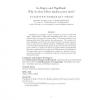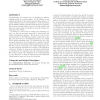202 search results - page 37 / 41 » Algorithmic Information Theory and Foundations of Probabilit... |
CSREASAM
2006
13 years 10 months ago
2006
Current computer security systems are based on the premise that once a user presents valid credentials to the authentication system (e.g. valid ID and password), they are granted ...
KDD
2009
ACM
14 years 9 months ago
2009
ACM
Time series prediction is an important issue in a wide range of areas. There are various real world processes whose states vary continuously, and those processes may have influenc...
IM
2007
13 years 8 months ago
2007
PageRank is a popularity measure designed by Google to rank Web pages. Experiments confirm that PageRank values obey a power law with the same exponent as In-Degree values. This ...
WWW
2009
ACM
14 years 9 months ago
2009
ACM
Understanding user intent is key to designing an effective ranking system in a search engine. In the absence of any explicit knowledge of user intent, search engines want to diver...
APPROX
2004
Springer
14 years 2 months ago
2004
Springer
A quantum encryption scheme (also called private quantum channel, or state randomization protocol) is a one-time pad for quantum messages. If two parties share a classical random s...


